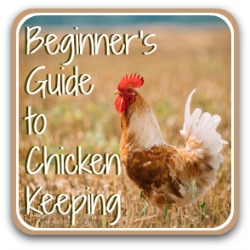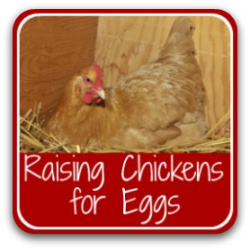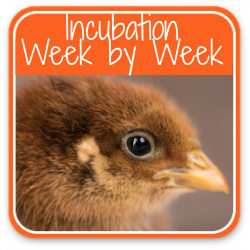Raising chickens in rural Italy: what's the difference?
Have you ever wondered what might it be like, raising a flock on a hillside, opposite a tiny hilltop village in a remote part of the stunning Italian countryside?
Many people dream of packing everything in and moving to live in a friendly, rural community in the heart of Italy.
The difference for me is that I've done it for over twelve years now.
I live in an old farmhouse on the side of a beautiful Italian valley in the heart of a region called Le Marche which, thankfully, not many people have ever heard of.
Here are what I consider to be the seven most obvious differences in backyard chicken keeping in Le Marche as opposed to anywhere else in the world.
What can those differences teach us about natural, environmentally friendly ways to raise chickens - wherever you are in the world?
1. In rural Italy, chickens are a way of life.
Everyone keeps chickens. It's just the way it is. There are no rules or regulations, no laws forbidding chicken-keeping. Chickens are viewed as part of the community.
Dawn breaks to the sound of crowing across the valley, my males waking everyone else's up. No-one cares. It would be much stranger if there were no crowing. No-one can understand any place where chickens, including male chickens, aren't allowed.
 Sunrise across the valley: the view from my chicken coop to our tiny hilltop village.
Sunrise across the valley: the view from my chicken coop to our tiny hilltop village.It's part of the gentle (if a little noisy) rhythm of life. Just as the church bells toll our news of life events - births, marriages, deaths - chicken sounds announce the daily routines: crowing at dawn, singing the egg song - loudly - mid-morning, screeching at dusk when foxes and pine martens prowl.
Families in this region are virtually self-sufficient, growing enough crops and keeping sufficient livestock to meet the family's annual needs.
Every November, our 60 olive trees produce enough delicious, peppery, pea-green oil to lasts us and the original owners of our house until the next November harvest.
And the chickens are there, roaming in the olive grove, to lend a helping hand. No-one thinks it's strange. It's just the way life is.

2. Chickens must earn their keep.
Marche is a rural area. Not for our community the bright lights of Rome or Venice. The population of our little village and its surrounding community at the last count was 536.
Evening entertainment is eating at our local family-run pizzeria (where we eat so often we were invited to the family wedding). Days are spent in fields, orchards, olive groves and vegetable plots. The church bells still call workers in at lunchtime and play the Angelus at 8pm.
Eating is seasonal: when we first moved here from England, I couldn't understand why there were no strawberries in the shops in winter. I was too used to the always available, and almost tasteless, fruit imported to the UK from who knows where.
We've learned to live by the gentle ebb and flow of the seasons, eating fresh produce grown organically within a few miles of our home.
Bring your basket and fill it with healthy products. No plastic packaging here, thank you!
 Eating seasonally means delicious, fresh fruit picked and sold a couple of miles from home.
Eating seasonally means delicious, fresh fruit picked and sold a couple of miles from home.And it follows that farm animals here have to earn their keep. Italian city life is different. Dogs are pets and chickens are absent.
Here, dogs are kept to herd or guard. Chickens are kept for their eggs and, when the eggs stop, the chicken is celebrated as the family's Sunday dinner.
No-one can understand why I keep my older, non-laying chickens, leaving them free to forage through their pasture, unafraid of being put in the pot. To Italians in this part of the world, that makes no sense.
So we agree to disagree.
3. Medicated food and chemical treatments are not a thing.
Maybe it's because chicken diets in Italy are supplemented by leftovers of those fresh, local, organic fruit and veg, but the fact is that no-one uses medicated feed. Chemical treatments to sustain chicken health in backyard flocks are also virtually unknown.
Chickens eat organic grain usually bought, it's true, from the local feed store. Their treats are past-its-best fruit from the family orchard, thrown on the compost heap for the birds to rummage through, and bugs, mice and unfortunate lizards they find in their free range foraging.
The harsh reality of life on an Italian farm is that, if a chicken becomes too ill to recover with time and care, it's dispatched quickly and painlessly by people who have been taught humane methods of euthanasia for generations.
I rely on my friend Graziella, when necessary. But the fact is that it's very rarely necessary. Once, for a hen who broke her leg and could no longer live a quality of life. And once or twice for roosters from a male-heavy hatch who had led a happy life to adulthood, but were over-using hens.
But illness? It's rare. There must be lessons to learn from that.
Small backyard flocks kept in natural, clean conditions and fed a good quality grain and healthy treats perhaps. Rather than large commercial operations where hens are squashed into cramped cages and never see the light of day.
4. Buying new chickens is simple, yet complicated.
I used to think chickens came from a market, or a feed store, or even from hatching eggs.
Not in my part of the world.
In my part of the world, they come from a little old lady who lives way out in the countryside.
To get there, you have to follow a series of complicated directions which involve turning left at the second patch of bamboo shoots and left again at the three oaks near the old wash-house. No, not the new wash-house (which is about a hundred years old) - the really old wash house.
Where, eventually, you find Signora Elvira, who raises the village's entire stock of chickens for the year and is very choosy about who she sells them to.
Luckily, I came with a recommendation from a respected local farmer. Phew.
 With Signora Elvira, my local supplier of chickens - but only if she thinks you're suitable.
With Signora Elvira, my local supplier of chickens - but only if she thinks you're suitable.Then you have a choice to make: brown chickens (Red Stars) or white chickens (the Leghorn, proper name Livorno).
Not for Marchigiani (people from Marche) any "fancy" breeds. I've raised lots of different breeds by bringing fertile hatching eggs by plane across from the UK, and they've been the talk of the village.
"Do they lay more eggs than our brown and white chickens?" I'm asked, and "if not, why would you want strange breeds?"
Because, after all, chickens just need to earn their keep. How they look simply isn't important here.
The fact that I insist different breeds make life more colourful and interesting does give the village something to talk about, though, and has been known to encourage visits from all and sundry - just to have a look.
5. Incubators are virtually unheard of.
The breed I've hatched which has probably caused local people to shake their heads in disbelief the most is the Polish (UK Poland) chicken.
I hatched this Polish chick in my Brinsea Octagon 20 incubator. I named him Sandro, after our builder.
You'll see why when you read the story below.
 Sandro the Polish chicken, named after our builder.
Sandro the Polish chicken, named after our builder.I came across this post from my Facebook page recently and thought it summed up pretty perfectly the Italian view of mechanical incubation.
Here it is, exactly as I posted it in 2015.
Slight panic this morning.
Work has started to convert our old cowshed into a large kitchen/living room. This morning's conversation went like this - in Italian, so it loses something in the translation.
Sandro (boss of builders): "We're going to switch off the electricity today".
Me: "OK, how long for?"
Sandro: "Six days".
Me: "You can't. I have eggs in the incubator". Sandro: "Eggs?" Me: "Yes, eggs. To hatch".
Sandro: "Why don't you use a hen?"
Me: "None of my hens want to be a mamma at the moment".
Sandro: "Are they Italian hens?"
Me: No. They're English".
Sandro: "That explains it. Italian hens would always want to be a mamma".
Pause while I take in this enlightenment in. Then ...
Sandro: "Where did you get the eggs from?"
Me: "England".
Sandro: "No, not the incubator. I understand the incubator comes from England. No-one in Italy would want to spend good money on an incubator when you have perfectly good Italian hens who want to be mammas. I mean, where do the eggs come from?"
Me: "Yes. The eggs come from England".
Sandro: "Why did you get them in England when we have perfectly good chickens in Italy?"
Me: "Because Italy doesn't have the breeds I want".
Sandro: "But these English hens don't want to be a mamma. Why would you want more?".
Me: "Well perhaps some of these will want to be a mamma".
Sandro, making a loud guffawing noise at the thought of English hens who will never want to be mammas: "Where are these eggs, anyway?".
Me: "In the incubator in the big bedroom".
Sandro: "I need to see them. Lads! Come and see these eggs".
5 burly builders plus Sandro the boss then go to inspect the incubator.
 Mike tries to explain to Sandro, our local builder, why we would use an incubator rather than a broody hen.
Mike tries to explain to Sandro, our local builder, why we would use an incubator rather than a broody hen.Sandro: "I've never seen anything like this. You could say it's an electric hen!".
Me: "Yes, and I can watch them hatch too".
Sandro pauses for reflection. Then...
Sandro: "When will they hatch?".
Me: "Wednesday 11th".
Mutterings amongst builders in a dialect waaaay beyond my comprehension. Then 5 burly builders disappear.
Sandro: "We want to watch these eggs hatch".
Me "OK. But what about the electricity?".
Sandro: "Bah! Who cares about switching off electricity when there are eggs to hatch?".
Gotta love Italy!
6. Sheepdogs double as chicken guardians.
Meet Luce (pronounced "Loo-chay", meaning Light). She is an Italian breed called a Maremma or, to give her the full title, Pastore Maremmano Abruzzese. "Pastore" means sheepdog.
Luce weighs 60 kilos (about 130 lbs), and she's my Livestock Guardian Dog. Her job is to keep the chickens safe. Since we have had her, we have not had one single chicken killed.
 Luce would never harm her chickens - but she's always keen to share their treats!
Luce would never harm her chickens - but she's always keen to share their treats!But wait - a sheepdog looks after chickens?
Yes - Maremmas have no prey instinct. She's the only dog I've ever had who has allowed chickens to jump all over her, without so much as a warning glance.
Maremmas are a part of rural life here in Marche. Our local shepherd, who grazes his sheep and goats on one of our fields, has six, plus herding dogs.
The Maremma doesn't herd. They are flock guardians, bred for their immense strength. They have a pure white coat so they disappear in the midst of a flock of sheep until an unsuspecting fox, wolf, bear (yes, there are still brown bears in Italy) or human makes the mistake of trying to steal a sheep.
And then, the Maremma turns from a beautiful, gentle, laid-back dog into a roaring ball of fury. They'll sound a warning bark first, but then...
If you ever see Maremmas on the hills of Italy, on no account approach their flock. You may pay a high price.
 Luce - patient with chickens, but always on the lookout for predators.
Luce - patient with chickens, but always on the lookout for predators.7. Eggs are neither washed nor refrigerated.
Why wash eggs? In Italy, they never are. Nor are they stored in refrigerated units, either in shops or in the home.
Italians in this area would think it was a very odd thing to do - in fact, it's not usual in Europe generally to store eggs in fridges.
The "bloom" on the outside of a chicken egg is a waxy layer the hen deposits over the shell which protects it and prevents bacteria from entering.
Washing gets rid of that layer, and therefore of the egg's natural protection. So eggs are collected frequently - twice a day in summer, more often in winter when the hens are inside more and eggs are likely to get dirty if left in nest boxes.
Washing therefore becomes unnecessary. It's basic good husbandry.
So eggs can be displayed in all their glory and deliciousness on kitchen worktops, without fear of anyone being poisoned.
 A collection of my chickens' fresh eggs - no need to wash!
A collection of my chickens' fresh eggs - no need to wash!It's all part of the healthy way happy chickens are raised in rural Italy.
















